One of the recurring themes on WGN America’s Manhattan is the willingness of Manhattan Project security to use extreme extrajudicial methods against scientists on the project they found suspicious, problematic, or dangerous. Episode 2 of this second season centered on an extreme case of this, with the main character, fictional scientist Frank Winter, being locked up without Constitutional protections (to say the least) in an effort to discover where his true loyalties lay. As ought to be pretty obvious, this isn’t (as far as we know) something that happened in real life: you can’t lock up all of your scientists if you expect to get a bomb built before the war ends.
However, this aspect of the plot is inspired by a healthy dose of actual history — even if it is history that is not always well-known. General Leslie Groves and the Manhattan Project security services did occasionally dabble in extrajudicial authority, taking advantage of the fact that the bomb project had its own, wholly autonomous security and intelligence force, and that wartime pressures allowed them to do things that were quite a bit outside of business-as-usual.
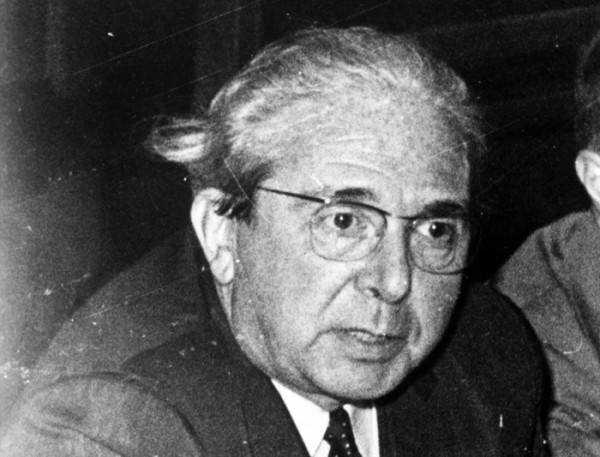
An agitated, concerned Leo Szilard in 1960. Source: Emilio Segrè Visual Archives.
Leo Szilard is one of the many historical characters who is distilled into Frank Winter’s personality. Szilard is one of the real characters of the Manhattan Project. A Hungarian émigré, he was the one who came up with the idea of the nuclear chain reaction, he was the one who urged the scientists self-censor their research, he was the one who got his friend Albert Einstein to write a letter to President Roosevelt calling for government coordination of fission research, and he was the one who circulated a petition against the dropping of the atomic bomb during the war. Frank Winter’s moral arc — moving from deep conviction about the need to rapidly build a bomb, to plaguing doubts — is heavily inspired by Szilard. 1
But Szilard could also be a huge pain in the neck. He was a natural gadfly, brilliant and utterly lacking respect for authority. It wasn’t just the military he ran into trouble with. The scientists Arthur Compton, Vannevar Bush, and James Conant all eventually ran afoul of Szilard’s views on what they ought to be doing, and each of them in turn found themselves highly irritated with Szilard. If Szilard worked under you, he inevitably became frustrated with you and your decisions, because no one was good enough for Leo Szilard. And his complete inability to just grin and bear it guaranteed that, over time, that feeling of frustration would become mutual. This put even his allies in a tough place, because while no one could deny Szilard’s brilliance or contributions to the bomb project, they also didn’t want to spend too much time with him.
But it was General Groves who really, really took an active dislike to Szilard. His views on him are aptly discussed in a June 1945 memo that Groves had drawn up:
Szilard is a physicist who has worked on the project almost since its inception. He considers himself largely responsible for the initiation of the project, although he really had little to do with it. When the Army took over the project, an intensive investigation was made of Szilard because of his background and uncooperative attitude on security matters. This investigation and all experience in dealing with him has developed that he is untrustworthy and uncooperative, that he will not fulfill his legal obligations, and that he appears to have no loyalty to anything or anyone other than himself. He was retained on the project at a large salary solely for security reasons. 2
In the postwar, Groves was even more to the point. Szilard was, he explained to an interviewer, “the kind of man that any employer would have fired as a troublemaker.” 3
Szilard and the military were a particularly bad fit. Szilard thought the military did things badly, and, in the end, that there were some bad people at the top. He didn’t hide his feelings on the matter. Rather, he blatantly told many people them — he feared the American military would assert a dictatorship, would use the bombs in a terrible way, and would jeopardize the future peace of the planet.
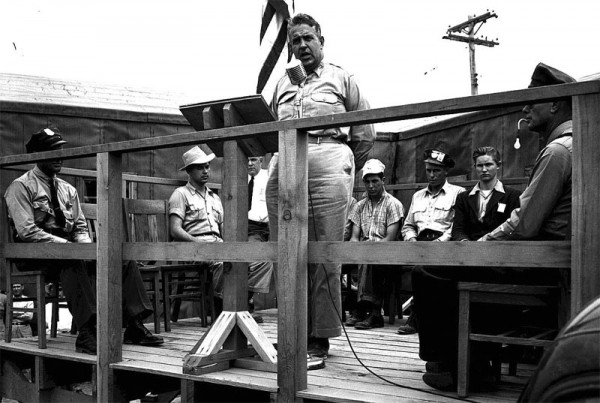
General Leslie Groves speaking to workers at Hanford in 1944. Source: Emilio Segrè Visual Archives.
And, from a certain perspective, he wasn’t too far off the mark. The Manhattan Project was asserting quasi-dictatorial powers during the war (and the bomb did bring with it rigid hierarchies, abnormal secrecy, and a lack of democratic process wherever it went in the Cold War), they were planning to use the bomb on civilians to make their point (which one can agree with or disagree with as a strategy), and they were decidedly not interested in any approach to world peace other than building up a large American nuclear arsenal (which in Szilard’s mind was a path to global suicide).
So you can see why he occasionally felt he might be better off not connected with such a project, and why he did (multiple times) attempt to jump the “chain of command” to contact civilian authorities (including both Presidents Roosevelt and Truman) to speak to him about his fears.
And you can understand why General Groves found this sort of behavior tantamount to treason. But as long as Szilard was under the watchful eye of the Manhattan Project security apparatus, Groves would tolerate him for the duration of the war — it was better to have Szilard close (and thus known), than it was to have him “in the wind.”
But in October 1942, for one brief moment, it was feared that Szilard might quit the project. Compton had attempted to move him out of the project in Chicago, and worried that Szilard might just take off. He was wrong — they worked out an agreement — but the fear of a disgruntled Leo Szilard prompted Groves to draw up a draft of an extraordinary order in the name of the Secretary of War:
October 28, 1942
The Honorable,
The Attorney General.Dear Mr. Attorney General:
The United States will be forced without delay to dispense with the services of Leo Szilard of Chicago, who is working on one of the most secret War Department projects.
It is considered essential to the prosecution of the war that Mr. Szilard, who is an enemy alien, be interned for the duration of the war.
It is requested that an order of internment be issued against Mr. Szilard and that he be apprehended and turned over to representatives of this department for internment.
Sincerely yours,
Secretary of War. 4
It was never sent. As far as we know, Groves never interned anyone in this manner during the war — though he did entertain the idea at least one other time, in the case of Hans Halban, another immigrant nuclear scientist with strong opinions and dubious loyalties (Halban was French, which is Groves’ book ranked slightly worse than Hungarian).
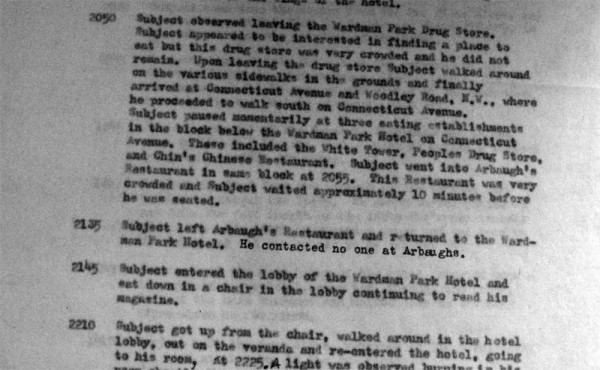
The stalking of Leo Szilard: excerpt from a report by a Special Agent of the Counter Intelligence Corps of Szilard’s movements during a 1943 trip to Washington, DC.
But he didn’t leave Szilard alone. He kept a close watch on Szilard and Szilard’s associates, even having the scientist tailed by Special Agents are various times during the war. He never learned very much of interest from these tails (and from the reports of Szilard’s actions, one suspects Szilard was at times aware of them), but one can imagine how delighted he would have been to have a good reason to throw Szilard in a cell and lose the key. “The investigation of Szilard should be continued despite the barrenness of the results,” Groves wrote in June 1943. “One letter or phone call once in three months would be sufficient for the passing of vital information.” 5
Groves kept up an active Szilard file through 1946. Szilard knew a lot, and Groves did not trust him. There is evidence in the files that Groves was trying to build an espionage case against Szilard around the time Szilard was trying to circulate his petitions against the dropping of the atomic bomb. But, no doubt to Groves’ frustration, it came to nothing.
But Groves kept Szilard on the payroll. Keep your friends close, and your gadfly scientists even closer, I suppose.
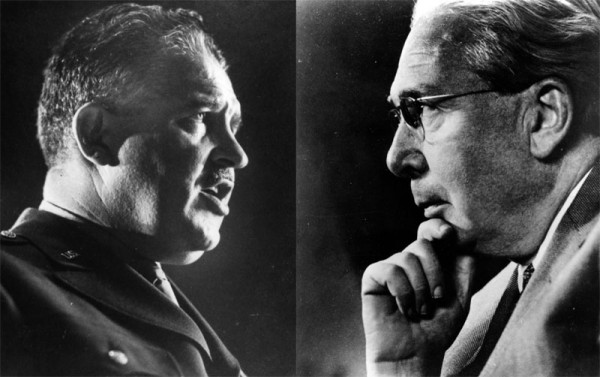
Groves and Szilard — two worthy opponents. Source: Emilio Segrè Visual Archives.
Can we imagine a world in which things had gone another way? In which Groves might have decided that the fear of a free-range Leo Szilard, running around the world doing who-knows-what and talking to who-knows-who, would be worth locking him up without hearing, representation, or appeal? What is one scientist in the light of the stakes that someone like Groves attached to this project?
It is impressive, in retrospect, that Groves, in the end, showed as much restraint as he did — Szilard was a troublemaker. But arguably, some of that trouble needed to be made.
- On Szilard’s petitions, Gene Dannen has compiled them all on his Leo Szilard website.[↩]
- Leslie Groves, “Resumé of Szilard and Pregel,” (1 June 1945), in Correspondence (“Top Secret”) of the Manhattan Engineer District, 1942-1946, microfilm publication M1109 (Washington, D.C.: National Archives and Records Administration, 1980), Folder 12: “Intelligence and Security,” Roll 2, Target 6.[↩]
- Quoted in Richard Rhodes, The Making of the Atomic Bomb (New York: Simon and Schuster, 1986), 502.[↩]
- As can be seen from the image, there were several edits made to the draft; I have applied them all in the quotation. Draft letter for the internment of Leo Szilard (28 October 1944), in Manhattan Engineer District records, Records of the Army Corps of Engineers, Record Group 77, National Archives and Records Administration, College Park, Maryland, Box 88, Folder 201, “Szilard, Leo.”[↩]
- Leslie R. Groves to Captain Calvert, “Background Information concerning certain Radiation Laboratories and Los Alamos Employees,” (12 June 1943), in Manhattan Engineer District records, Records of the Army Corps of Engineers, Record Group 77, National Archives and Records Administration, College Park, Maryland, Box 88, Folder 201, “Szilard, Leo.” See also, Report of Counter Intelligence Corps Special Agent Charles N. Ronan, “Subject; Dr. Leo Szilard,” (24 June 1943), in the same folder.[↩]
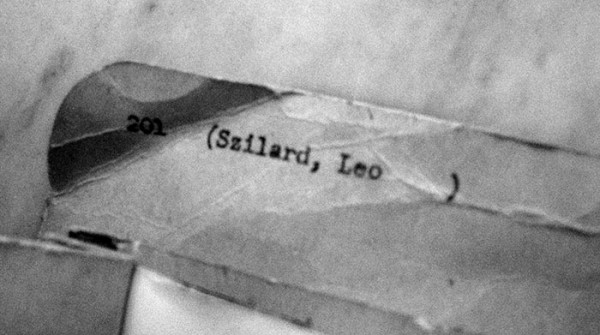
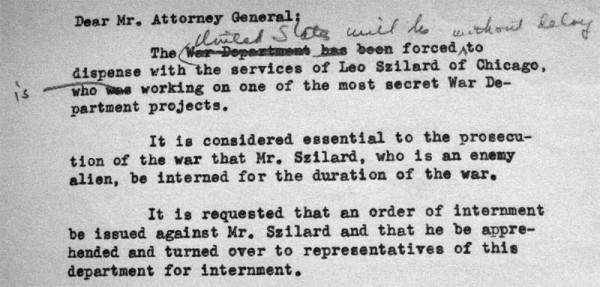

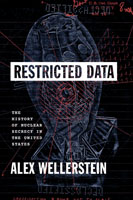
Can we imagine a world where the bomb hadn’t been dropped on Japan and we had proactively shared research with the Russians? We do share nuclear research with them now. Nuclear weapons, however, drive politics at the highest levels and still give those that have them the final say in any dispute.
You need a “share on Facebook” button when you email or post this stuff.
Being on Groves’ enemies list was like being on Richard Nixon’s enemies list. Many people considered being on Nixon’s enemies list one of the greatest honors of their lives.
Szilard was unquestionably Groves’ top enemy, and his paranoid obsession with Szilard’s dissent was truly Nixonian. Groves’ security agents did far more than shadow Szilard’s movements. Without warrants, they repeatedly searched Szilard’s rooms, and monitored his mail and phone calls.
There were, in fact, real spies on the Project, but Groves’ draconian security measures found none of them. Like Nixon, he confused dissent with treason, and focused on the dissenters.
It wasn’t actually Groves’ deliberate policy to keep Szilard on the Project, as Groves later claimed, and as you wrote. Groves was determined to obtain Szilard’s patent rights by any means, and he forced Szilard to choose between giving up his patents or leaving the Project. Szilard considered leaving the Project to be the same as a soldier deserting his post in wartime, and he felt he had no choice but to stay.
If he had left the Project to protect his patent rights, I think it’s almost certain that Groves would have imprisoned him.
The patent issue was certainly an important cause, but I think it was as much about the temerity of Szilard to resist Groves (and Bush, and Conant, who were also involved in the patent seizure attempt) as much as it was about the specifics of the patents.
The question of what to do with troublesome scientists came up a few times, with Bush, Compton, and Groves. The French scientists were another major issue of this sort, where Groves didn’t really want them operating as free agents, but also didn’t want them to have much access to important information, so he founds ways to keep them in the system, but isolated. In February 1942, Bush expressed this philosophy in a letter to Naval security:
In this case, he was writing about another scientist with security clearance problems… Arthur Compton! (Whom the Navy would not clear, because Compton had signed one too many dubious petitions…)
Do you know if Otto Frisch, Rudolf Peierls or both got the idea of a nuclear chain reaction from Szilard or did they come up with it independently?
Szilard was a very unusual character and I would enjoy for you to convince me that he was indispensable to the project. What contribution did he make, other than ideas that could have come from others? If Frisch and Peierls conceived of a bomb using U-235 independent of any ideas coming from Szilard and if the subsequent MAUD reports from Britain actually got the US program moving with a purpose, was Szilard even necessary? No one liked having him around and it seems his absence would have been a benefit to the others working on the project. I can easily imagine him being locked away for the duration. Torture, no, can’t imagine that. I had a hard time with this week’s episode.
Szilard had the general idea of a neutron-based nuclear chain reaction even before fission was discovered, and immediately saw fission’s application to it in early 1939. So he had the idea before Frisch and Peierls, no doubt. Lots of people were thinking about U-235 chain reactions after fission was published, and it became completely obvious to everyone after the existence of secondary neutrons was published by Joliot et al. in April 1939.
What Frisch and Peierls did in 1940 was to calculate the critical mass of pure U-235 using a fast neutron chain reaction — something that had not been previously done. The previous calculations were focused on slow neutrons, more like a reactor than a bomb; even Szilard and Fermi were focused on slow neutrons early on (it is one of the things that is tricky to understand about the past since it is so obvious today that fast neutrons are the thing). They found the mass you needed was not very large — only a few kilograms (later revised upwards to 11 kilograms in the MAUD Report). This is actually quite overly optimistic (the bare sphere critical mass for U-235 is more like 50 kg; the Little Boy bomb used 64 kg of 80% enriched material).
Just wanted to clarify what each of these people did — it is not a question of Frisch and Peierls versus Szilard. The Frisch Peierls innovation is purely about calculating the critical mass for a certain type of chain-reacting system (pure U-235, fast neutrons, no moderator), and finding it to be very low, thus making bombs look very feasible (too much so, as it turns out).
Alex, An excellent post. But I’m not sure “restraint” best describes Groves’ animus toward Szilard, whose professed hobby was “baiting brass hats.” Groves recalled going all the way to the office of the Secretary of War to have Szilard interned. And Groves did take Szilard off the payroll during the war, when negotiating for his patent rights for the chain reaction. Groves also saw to it, behind the scenes, that Szilard’s contract was not renewed for atomic energy work in the spring of 1946. There are many other examples of Groves’ anger and mistrust towards Szilard. A sorry tale. William Lanouette
You might have also mentioned that Fermi didn’t get along with Szilard after Szilard refused to get his hands dirty in the building of the CP-1 rector in Chicago, Szilard felt he was there as brains, not brawn, and so he hired a stand-in to do the physical labor for him. This irritated Fermi such that he never worked with Szilard again.
The problem with Leo Szilard was that he was so very cocksure about everything he “thought” he “knew”. He was a brilliant scientist to be sure, but was pretty much wrong on every call he made on issues of national policy.
For example, the whole purpose of the Manhattan Project was to deter Hitler? No cupcake, that was YOUR purpose of working on the project. But it wasn’t the only purpose of the project.
Also, we shouldn’t have used it because it would spur the Soviets to start developing those weapons? Well, except for the part that the Soviets had spies at Los Alamos. Seems to me that would mean they already wanted those weapons.
Szilard was an arrogant ass who assumed his scientific genius gave him some special competence in other matters.